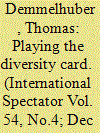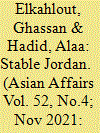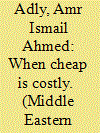| Srl | Item |
| 1 |
ID:
165787


|
|
|
|
|
| Summary/Abstract |
Using Iraqi archival resources and newspapers, this article analyzes strategic perceptions of the multilateral United Nations embargo (1990–2003) by Saddam Husayn and his Ba'th Party. It shows how the regime prioritized agricultural self-sufficiency to break the embargo, used food rationing to avert famine, and instrumentalized food trade to reward cronies and punish opponents. Food security, hydropolitics, and agriculture ranked prominently in regime discussions as they were regarded as crucial to safeguard political legitimacy and assure regime survival.
|
|
|
|
|
|
|
|
|
|
|
|
|
|
|
|
| 2 |
ID:
169224


|
|
|
|
|
| Summary/Abstract |
Since the 2003 regime change in Iraq and the 2011 Arab uprisings, the political map of the Middle East has been in flux. Regional actors have taken advantage of emerging windows of opportunity, which have affected the outcome of this process. Saudi Arabia’s role as an aspiring regional hegemon in the region is salient: the country’s assertive course in shaping its neighbourhood coincides with a more independent foreign policy that goes beyond the traditional US alliance and seeks to diversify its international partners. This diversification of Saudi foreign policy since the ascension to the throne of King Salman in 2015 is explained by using the IR concept of hedging.
|
|
|
|
|
|
|
|
|
|
|
|
|
|
|
|
| 3 |
ID:
111531


|
|
|
| 4 |
ID:
183184


|
|
|
|
|
| Summary/Abstract |
The Hashemite Kingdom of Jordan has recently experienced large-scale unrest on a scale not witnessed for several years. The country, long viewed as a beacon of stability in a deeply fragile region, now faces a growing risk that it could be destabilised. This article addresses multiple pillars of stability and drivers of instability in Jordan, including the impact of the Syrian crisis, large-scale displacement, resource scarcity, and chronic political, economic, and social difficulties. Whilst the regime has endured crisis and remained stable, increasing pressures in the past few years have led analysts to predict the onset of violence or deepening instability in Jordan.
|
|
|
|
|
|
|
|
|
|
|
|
|
|
|
|
| 5 |
ID:
102599


|
|
|
|
|
| Publication |
2011.
|
| Summary/Abstract |
It has been held that external rents significantly affect the formation of state institutional capacities as constant flows of rents tend to weaken the capacity to regulate, monitor and restructure the economy. This gives rise to the formulation of a question in reverse: would a steady and consistent decline in rents instigate state capacity building? This study argues that the impact of rent decline on capacity building is politically mediated by the institutional features of the ruling regime which determine the extent to which dwindling rents adversely affect the incumbents' chances of political survival. In Mubarak's Egypt, the ruling incumbents could survive with less rent by resorting to more repression and curtailing political participation and could thus evade the cost of state reform. In that setting, cheap regime survival proved to be quite costly for the overall economy.
|
|
|
|
|
|
|
|
|
|
|
|
|
|
|
|